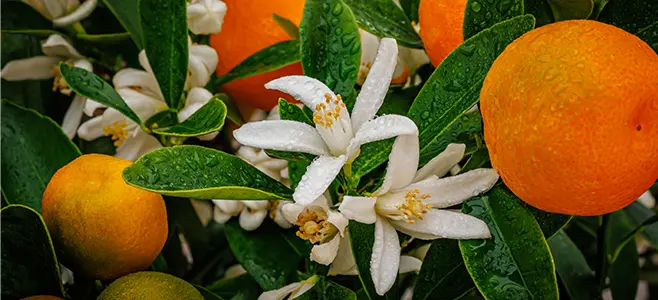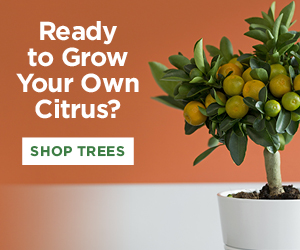
Deciding what to plant in your garden for spring can be half the battle. Planting fruit-bearing trees and bushes can guarantee you’ll have fresh produce throughout the summer months.
But sometimes, you’re aiming for beauty, and having an orchard that’s filled with blooming flowers can be the perfect addition to your yard. So before planning everything out, you’ll probably want to know if flowering plants and fruit trees can grow together.
Luckily, these plants can grow cohesively in the same space so that you can have beautiful blooms and fresh fruit all summer long. However, you’ll also want to understand which flowering plants can coexist with fruit trees to create a productive garden and which combinations should be avoided.
Companion Planting
You’ll want to consider this planting method when introducing flowering plants and fruit trees. But what is companion planting? This is when you select plants specifically because they will increase benefits for each other.
These can include increasing pollination or natural pest repellent. One popular garden combination is corn, beans, and squash planted together. The corn acts as a trellis for beans, the squash acts as ground cover, and the beans contribute to nitrogen-rich soil.
There are other benefits that can come from companion planting, like weed prevention, fixing nitrogen, amending or covering the soil, reducing evaporation, providing a living trellis, maximizing space, and finally, producing more food (or fruit in this case). But with so many types of flowering plants out there, which are best for growing with fruiting trees?
Best Companion Plants For Fruit Trees
With so many flowering plants available for planting, it can be overwhelming to decide what will be best to plant with your fruit trees. However, it can be broken down into the benefit you’re looking to get from that companion plant.
After you know which benefits you’d like for your orchard, it’s easier to pick out the perfect flowering plant to complement your fruit-bearing trees. Here are some popular options and what benefits they’ll offer to your garden.
Comfrey
As one of the most popular companion plants, Comfrey will produce great results while adding a pop of color to your orchard. The main reason this is so widely used is that it grows well with just about any other plants outdoor.
Not only does this plant attract important pollinators, but it also grows tall quickly. As a result, it tips over quickly and becomes a great mulch for other plants. This mulch not only adds nutrients to the soil but reduces evaporation and protects roots from the elements. However, this plant does grow quickly and can spread aggressively, so some gardeners prefer Russian Comfrey which is sterile seeds and will not spread as far.
Cover Crops
These fantastic plants are used to fix nitrogen in the soil to create a great environment for fruit trees, and there are a wide variety of these plants to pick from for your orchard. This nitrogen boost is essential when planting fruit trees, including citrus trees, because they require so much nitrogen to flower and produce.
Some common examples of cover crops you could use between your fruit trees include; clover, pea, chickpeas, soybeans, alfalfa, lentils, peanuts, and most other legume or bean plants. These companion plants can also help slow erosion, retain water, prevent weeds, and control pests or diseases.
Alliums
Plants like garlic, onion, and chives are the perfect natural repellant for many unwanted orchard and garden pests. The strong flavors and scents given off by these plants will deter larvae, aphids, mites, and even larger threats like rabbits and deer.
You’ll want to avoid planting these with other allium plants or legumes because they will not benefit one another and could cause both plants to fail. These plants also have shallow root systems, making them a good option to be planted just outside the canopy of your fruit tree.
What Combinations To Avoid
While it’s clear there are plenty of flowering plants that can be grown near fruit trees that will benefit the plant and help it produce a healthy crop of fruit, there are also plenty of plants that should be avoided when trying to grow a productive orchard.
You’ll want to avoid deep-rooted plants like potatoes, carrots, and other similar tubers or root vegetables. These placed too close to fruit trees will damage the tree’s shallow roots, which are more sensitive than roots of other plant types. Avoid planting citrus trees near these types of plants as well.
Don’t plant nut trees too close to any fruit trees, including citrus plants. While they may not affect all varieties, some nut trees produce a chemical in the soil called juglone, which can be harmful to fruit trees and other plants.
Growing Fruit Trees Together
When considering which fruit trees you’re going to plant, it’s important to note that some are sterile alone and will require a pair or another fruit tree alongside them before they will bear any fruit. In addition, these plants will require outside pollination from bees, wasps, butterflies, and other insects you’ll find in your garden.
Trees that need to be planted in pairs include; apple, blueberry, pear, plum, sweet cherry, and muscadine grape. You can also consider self-fertile fruit trees like apricot, blackberry, currant, nectarine, raspberry, sour cherry, pomegranate, strawberry, and more. These will utilize cross-pollination to bear fruit each year.
Fruit Tree Combinations To Avoid
There are plenty of fruit trees that do well with each other and can even help one another with cross-pollination and other benefits. However, there are some fruit trees that should not be grown together because they won’t be successful in such a small vicinity.
You’ll want to avoid planting; apples or apricots with walnuts and blackberries; nectarines, pears, peaches, or plums with raspberries; and finally, blueberries, cherries, grapes, and melons do not grow well near tomatoes or eggplants.
Enhance Your Yarden Today
As you can see, the right flowering plants and fruit trees will thrive with each other in the same orchard. The benefits can go both ways, and creating a good combination of fruit trees and flowering plants will help you to achieve a productive garden and get a great crop of fresh produce.
Be sure to check out the wide varieties of citrus tree for sale along with fruit trees, various edible plants, and other citrus plants for sale from Yarden to get your orchard started with the exact combination of fruit-bearing plants you decide on.

